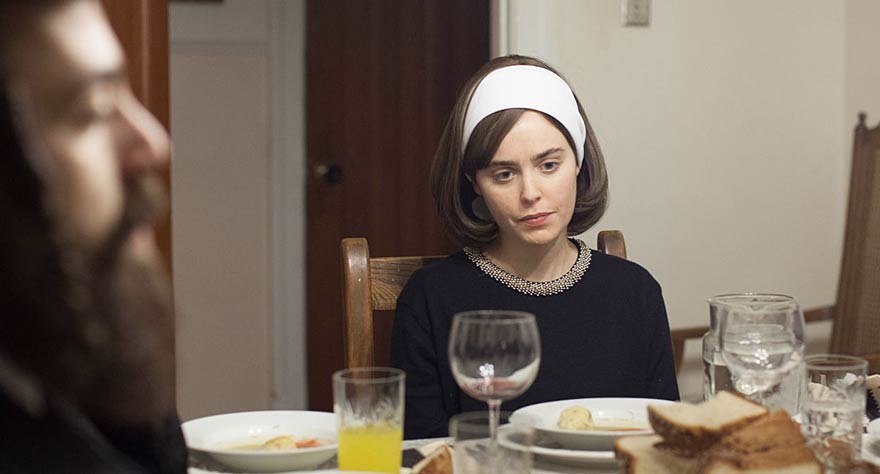
An otherworldly performance from Hadas Yaron propels this rich, slow-burning tale of cultural suffocation and forbidden love.

An otherworldly performance from Hadas Yaron propels this rich, slow-burning tale of cultural suffocation and forbidden love.
Tales of forbidden love are as old as film itself (older, really, when you consider stories from the likes of Shakespeare, the Bible, and Greek Mythology). Despite the number of films that have tapped the well of infidelity in the past, filmmakers are routinely compelled to revisit the subject, offering everything from new interpretations of old stories to new twists on old themes. Canadian filmmaker Maxime Giroux chooses the latter path for his latest film, the rich drama Felix and Meira.
Felix (Martin Dubreuil) is a secular, single, middle-ager living life out of pocket. His father, a man from whom he had been estranged for ten years, passes away not long after a sad deathbed reunion. This loss causes Felix to ponder his own life choices.
Meira (Hadas Yaron) is a young Hasidic woman who lives nearby. She is married to Shulem (Luzer Twersky) and together they have a small child. But their life is far from perfect. Meira is oppressed by her husband’s strict adherence to a faith that brings with it a dogma that offers little for women—especially a young, beautiful woman with a penchant for the very arts her religion denies her.
A chance meeting in a Montreal bakery brings Felix and Meira together. Still aching from his father’s death, Felix is interested in Meira’s religious perspective, while she’s interested in his drawings and his life in the secular world. What begins as a tentative acquaintance blossoms into something so much more. Despite their differences—age, faith, worldly ways, marital status—their attraction to each other is undeniable. Their outward efforts to be together only reinforce those inner feelings.
What a wonderful story this film tells, as cowritten by Giroux and Alexandre Laferrière. Felix and Meira takes the traditional trappings of a tale of forbidden love—trappings that are overt at best and flirt with being cliché at worst—and submerges them all in a world of cultural oppression. This is the genius of the story’s construct, really. Meira isn’t some young, sad housewife looking for a man who will make her happy (even if only temporarily), nor is she stuck in a rut and looking for an exciting diversion. She is trapped by her husband’s devout faith.
Giroux and Laferrière are careful about this delineation. The little things Shulem catches Meira doing before her encounter with Felix are violations of Hasidic dogma, not affronts to him as her husband; that said, as a devout man of faith he disciplines her accordingly. Unfortunately Shulem sees himself as an extension of his own faith, while Meira sees him as the poster child for it and cannot separate him from it. This cripples their marriage.
Once Felix and Meira meet, the burn of their relationship is incredibly measured. Felix’s maturity reigns here, as he knows she is a woman who is working her way through enormous personal change for a chance at something better. Sometimes that enormous change must come in tiny steps. There is a wonderful scene early in their acquaintance where Meira struggles to make basic eye contact with Felix. It isn’t because she is shy, but because Hasidic rules do not allow for women to look into the eyes of other men. Little things like this become enormous hurdles for Meira, and Felix waits for her to clear them. The film is full of these wonderful moments.
In the role of Meira, Hadas Yaron is mesmerizing. As the story slowly unfolds, she carries with her an incredible frustration that she struggles to conquer. This happens not only while she is with Shulem, but even when she is away from him. Yaron understands that the specter of Meira’s faith will be with her no matter where Shulem might be, and it looms. Yaron also knows the slow burn of the film happens at her character’s pace, and she manages that pace remarkably.
Sadly, the same can’t be said for Felix’s character development. Unlike Yaron, he has no chance to take his character through any type of emotional transformation. The back story of his estrangement from his father and his father’s passing only seems to serve as an excuse for him to see Meira in her traditional garb and pose faith-based questions as an icebreaker to their eventual relationship. Dubreuil is perfectly fine in the role, but his character ultimately serves only as a means to Yaron’s character’s end.
Either on its own or as part of a sublime Hadas Yaron double feature with 2012’s Fill the Void (another film the actress dazzles in), Felix and Meira handles the familiar tale of love and oppression with rich care and unique perspectives.